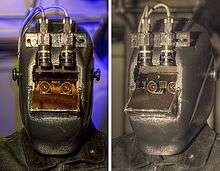Computer-mediated reality



Computer-mediated reality refers to the ability to add to, subtract information from, or otherwise manipulate one's perception of reality through the use of a wearable computer or hand-held device[1] such as a smartphone.
Typically, it is the user's visual perception of the environment that is mediated. This is done through the use of some kind of electronic device, such as an EyeTap device or smart phone, which can act as a visual filter between the real world and what the user perceives.
Computer-mediated reality has been used to enhance visual perception as an aid to the visually impaired.[2] This example achieves a mediated reality by altering a video input stream light that would have normally reached the user's eyes, and computationally altering it to filter it into a more useful form.
It has also been used for interactive computer interfaces.[3]
The use of computer-mediated reality to diminish perception, by the removal or masking of visual data, has been used for architectural applications, and is an area of ongoing research.[4]
The long-term effects of altering perceived reality have not been thoroughly studied, and negative side effects of long-term exposure might be possible.
As a seeing aid
In the 1970s and 1980s, Steve Mann introduced the Generation-1 and Generation-2 "Digital Eye Glass", initially as a vision aid to help people see better, as a welding helmet,[5][6][7][8] and as a general-purpose seeing aid for everyday life as outlined in IEEE Technology & Society 31(3)[9] and the supplemental material entitled "GlassEyes".[10]
In this sense, mediated reality is a proper superset of mixed reality, augmented reality, and virtual reality, as it also includes, for example, diminished reality.[11]
Window managers
One common window manager in mediated reality is the "Reality Window Manager".[12]
Wireless mediated reality
Bluetooth devices are often used with mediated reality.[13]
With wireless communications, mediated reality can also become a communications medium among different communities.[14]
With the use of EyeTap, such interaction is called "seeing eye-to-eye".[15]
Applications
Applications of mediated reality include devices that help people see better, as well as devices for gaming and equipment repair, telemedicine, remote expert advice interfaces, and wayfinding. Mediated reality is also used in robotics[16] and drawing applications such as the "Loose and Sketchy" drawing package.[17]
Related concepts

Mediated reality is related to other concepts such as augmented reality (which is a special case of mediated reality), virtual reality, etc.[18]
See also
References
- ↑ "Wearable,Tetherless, Computer-Mediated Reality", Technical Report #260, M.I.T. Medial Lab Perceptual Computing Section, Cambridge, Massachusetts, 1994
- ↑ Video mediation
- ↑ Grasset, R.; Gascuel, J. -D.; Schmalstieg (2003). "Interactive Mediated Reality". The Second IEEE and ACM International Symposium on Mixed and Augmented Reality, 2003. Proceedings. pp. 302–303. CiteSeerX 10.1.1.109.7275
 . doi:10.1109/ISMAR.2003.1240731. ISBN 0-7695-2006-5.
. doi:10.1109/ISMAR.2003.1240731. ISBN 0-7695-2006-5. - ↑ See, for instance, here and here
- ↑ Quantigraphic camera promises HDR eyesight from Father of AR, by Chris Davies, SlashGear, Sep 12th 2012
- ↑ IEEE Spectrum
- ↑ IEEE Computer
- ↑ A magical welding helmet that lets you see the world in HDR–in real-time
- ↑ Through the Glass, Lightly, IEEE Technology & Society, Volume 31, Number 3, Fall 2012, pages 10-14
- ↑ "GlassEyes": The Theory of EyeTap Digital Eye Glass, supplemental material for "Through the Glass, Lightly", IEEE Technology and Society, Vol. 31, No. 3, Fall 2012
- ↑ Mann, S., & Fung, J. (2001). Videoorbits on EyeTap devices for deliberately diminished reality or altering the visual perception of rigid planar patches of a real world scene. Proceedings of the Second IEEE International Symposium on Mixed Reality, pp 48-55, March 14–15, 2001.
- ↑ Mediated Reality, by Steve Mann, Linux Journal, Article No5, Issue59, 1999march01, ISSN 1075-3583
- ↑ Mediated Reality Bluetooth Device Locator by S Parikh et al., IEEE CSIDC 2002
- ↑ Guo, Z.; Zhu, J. J. H.; Chen, H. (2001). "Mediated Reality Bites: Comparing Direct and Indirect Experience as Sources of Perceptions Across Two Communities in China". Int. J. Public Opin. Res. 13 (4): 398–418. doi:10.1093/ijpor/13.4.398.
- ↑ Tang, F.; Aimone, C.; Fung, J.; Marjan, A.; Mann, S. (2002). "Seeing Eye to Eye: a shared mediated reality using EyeTap devices and the VideoOrbits Gyroscopic Head Tracker". Proceedings. International Symposium on Mixed and Augmented Reality (PDF). pp. 267–268. CiteSeerX 10.1.1.134.7981
 . doi:10.1109/ISMAR.2002.1115106. ISBN 0-7695-1781-1.
. doi:10.1109/ISMAR.2002.1115106. ISBN 0-7695-1781-1. - ↑ Daniel Suarez: Daemon: Bot-mediated Reality (discussion of Mediated and Augmented Reality, bots, etc.)
- ↑ Haller, M.; Landerl, F.; Billinghurst, M. (2005). "A Loose and Sketchy Approach in a Mediated Reality Environment". Proceedings of the 3rd international conference on Computer graphics and interactive techniques in Australasia and South East Asia. pp. 371–379. CiteSeerX 10.1.1.61.6181
 . doi:10.1145/1101389.1101463. ISBN 1-59593-201-1.
. doi:10.1145/1101389.1101463. ISBN 1-59593-201-1. - ↑ Mediated Reality with implementations for everyday life, Presence Connect, MIT Press journal PRESENCE: Teleoperators and Virtual Environments, Date Posted: 2002 August 6
External links
- EyeTap.org Mediated Reality Research
- Mediated Reality based on the VideoOrbits head tracker
- Diminished Reality example to show something where Mediated Reality is definitely a proper superset of Augmented Reality